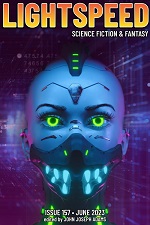“The Bone-Gatherer’s Lament” by Wendy Nikel
“Spaceship Joyride” by Dominique Dickey
“Jaywalk the Stars” by Elad Haber
“And All the Fields Below” by Sarah Grey
“Queen of the Andes” by Ruth Joffre
“Bestiary viventem” by Kyle E. Miller
“Always Personal” by Rich Larson
“Philoctetes in Kabul” by Deborah L. Davitt
Reviewed by Mina
“The Bone-Gatherer’s Lament” by Wendy Nikel repeats “the desert is full of bones” like a chorus in a hymn to the fallen. The bone gatherer doesn’t just gather the bones in the desert, he listens and brings them peace: “with rough-carved rocks and desert flowers, the Bone-Gatherer remembers them all.” Simply beautiful.
“Spaceship Joyride” by Dominique Dickey is exactly that. One teenage boy hotwires a spaceship to impress another teenage boy. After their arrest, he explains to his friend that, not only was it a date, but that they have been dating for a while. Sweet but without syrup.
“Jaywalk the Stars” by Elad Haber is exactly what the title says, two people who decide to jaywalk in space. It doesn’t examine just the joys of risk taking; it also shows the lethal repercussions. It’s written in the second person, which can be irritating, but it works here.
“And All the Fields Below” by Sarah Grey is a lovely but simple story. It cannot get too complex because we are in the mind of a dog, Parker. And Parker is loyal to the ghost of a dead child, Eli, refusing to leave him on his own; he hides and goes hungry to be able to stay with Eli. In the end, his faithfulness is rewarded when he acquires a new family without having to desert Eli. And Eli learns to share. A sweet, well-written story but not cloying.
“Queen of the Andes” by Ruth Joffre imagines life in a refugee shelter in the Andes. Humanity has managed to destroy the Earth’s climate so that the planet is no longer liveable. Many have already left for the space colonies. All that remains are the underground refugee camps. The protagonist has spent most of her life in one, looking after a massive and rare plant with her abuelita. There is a lottery for those who will leave on the next ship and the protagonist takes part in it. Interestingly, leaving is presented as a loss of freedom. Real and correct Spanish is spoken (not Spanish from “Google translate” thrown in by an author who may have researched everything else down to the tiniest detail but not understood that it’s good to get a native human speaker look at the Spanish!). A story that shows that even in a limited environment, we always have choices and responsibilities.
“Bestiary viventem” by Kyle E. Miller is a charming tale. Teenage Finch inherits a live bestiary when his father dies. A whole host of ink-drawn creatures like dragons and basilisks care for the orphan. The locals become suspicious and afraid and try to burn the farmhouse with Finch in it. The last line is priceless and the story is worth reading to be able to savour it.
“Always Personal” by Rich Larson follows a detective as she investigates murder cases involving “inverse stabbings”. It could be a normal detective story, just one that involves DNA and bioprinters that don’t exist (yet). It’s short and has a clear message about the right to choose. “Calcified anguish” is an excellent marriage of words too.
“Philoctetes in Kabul” by Deborah L. Davitt weaves together the life of a modern-day soldier and that of Philoctetes in the Iliad. An anonymous soldier is discharged from the army on medical grounds, having been betrayed and abandoned by friends. After losing his wife and job, the two old comrades who betrayed him invite him to work with them as military contractors. It is a sad and reflective tale, with hints of a past life. It shows what living with a chronic, invisible disability is like. And it asks the question—how does a man battered by war find peace?
Mina asks readers to spare a moment to think of the people they may know living with chronic, (in)visible disabilities. Wish them strength, coz you can’t wish them well.
 Lightspeed
Lightspeed